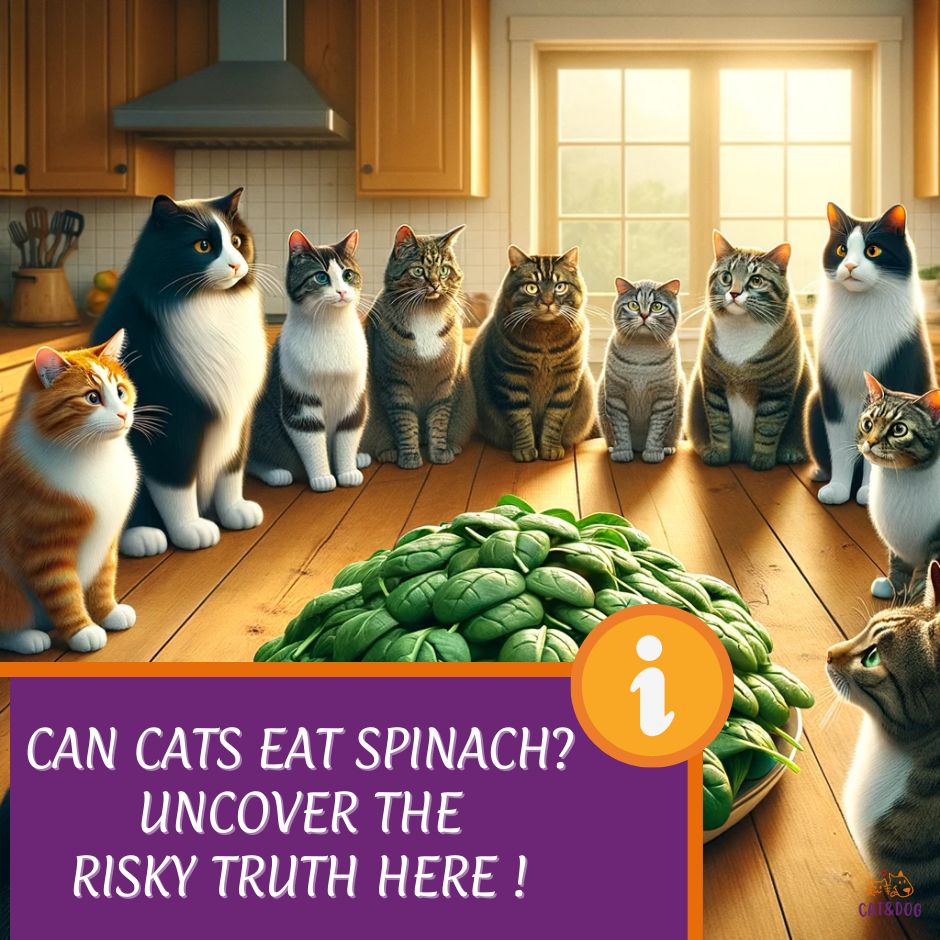Ever wondered if those leafy greens you’re about to throw into your salad are safe for your feline friends, or rather, can cats eat spinach?
Cats naturally lean towards a carnivorous diet, but a bit of greenery can be beneficial too. (1)
You might be surprised to learn that spinach—a vegetable packed with nutrients beneficial for humans—is also something you can occasionally share with your cat, making it a great option for pet parents.
But before you do, there are some important considerations to weigh, including whether cats can eat Popeye spinach, how you should prepare spinach for cats, and the health benefits and possible risks of feeding cats spinach.
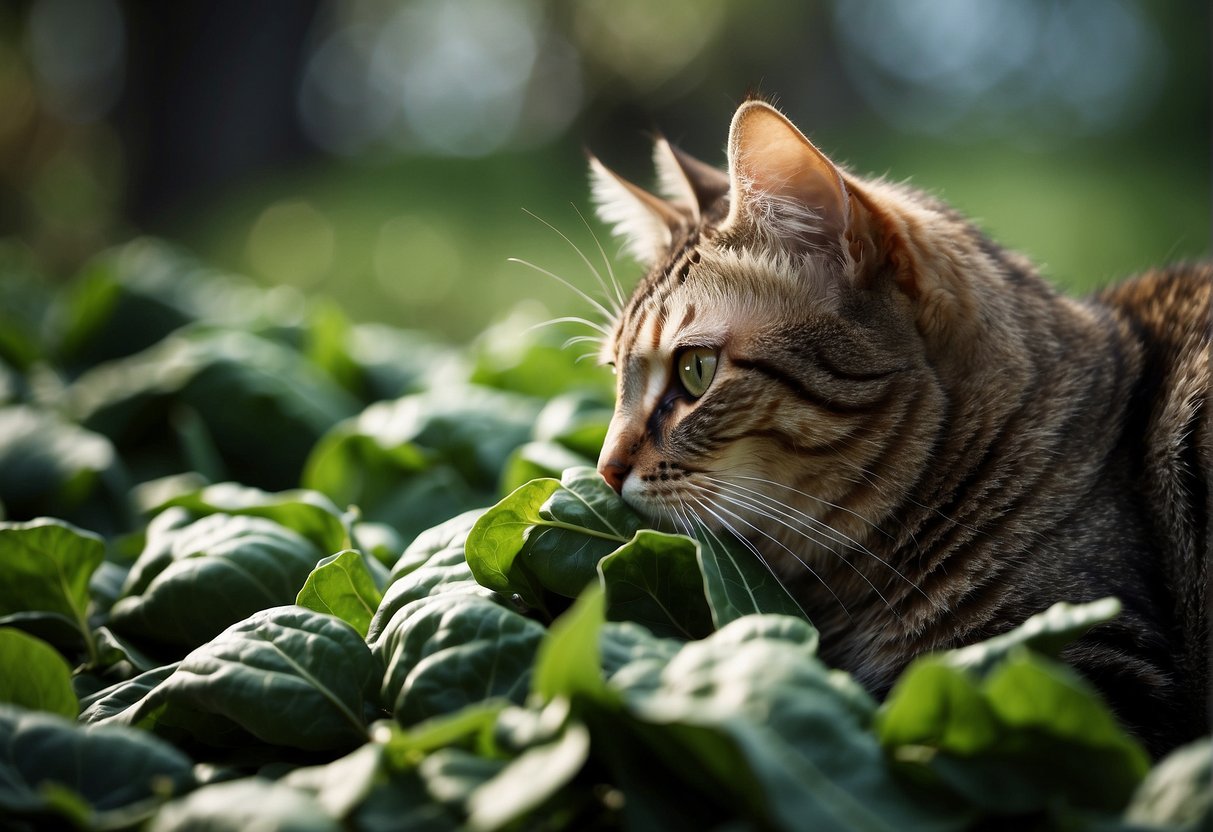
When it comes to cats and spinach, moderation and the specific health of your cat take center stage.
Spinach is rich in vitamins A, C, and K, as well as minerals like iron and dietary fiber, which can all play a part in a healthy, balanced diet. (2)
Yet, kitties with certain medical conditions might not react well to this veggie.
It’s also worth remembering that while spinach is non-toxic to cats, it shouldn’t replace their regular cat food, which fulfills their essential nutritional requirements, including essential vitamins like folic acid.
Plus, let’s be real, your cat would probably nose-dive into a bowl of chicken before leafing through spinach and folic acid.
Key Takeaways
- Spinach contains vitamins and minerals that can be part of a balanced diet for cats.
- It’s important to feed spinach to cats in moderation and consider the cat’s health to avoid cat digestive issues.
- Spinach should be an occasional treat, not a staple in a cat’s diet.
Nutritional Benefits of Spinach for Cats
While you might enjoy spinach in your salad or smoothie, it turns out that this veggie can offer some nutritional benefits to your feline friend too.
Vitamins and Minerals:
Spinach is a powerhouse of essential nutrients beneficial for your cat’s overall health. Here’s a quick peek at what it offers:
- Vitamin A:
Crucial for maintaining good vision, growth, and a robust immune system. - Vitamin B6:
Plays a vital role in glucose generation, red blood cells, and nervous system function.(3) - Vitamin K: Necessary for proper blood clotting.
Spinach also comes with a mineral-rich profile, including:
- Magnesium:
Supports bodily processes, including energy production and enzyme activation. - Iron:
Important for blood cell health and oxygen transport. - Calcium:
Essential for strong bones and teeth, as well as muscle function.
When it comes to the fiber content, spinach can aid in digestion and contribute to weight management due to its low calorie count. (4)
This can be particularly useful if your cat needs to keep a check on its weight without missing out on essential nutrients. And did you know that spinach even contains Omega-3 fatty acids?
It’s true!
While not as rich in Omega-3s as some fish oils and certain seeds, spinach does offer these beneficial fats, which are known to support skin health and reduce inflammation. (5)
While spinach can offer nutritional benefits, it’s essential to be aware of the digestive risks for cats, particularly for those with sensitive stomachs or pre-existing health conditions.
Remember, moderation is key. A nibble here and there adds to a varied diet but shouldn’t replace a cat’s main meals.
Always consult your vet before introducing new human food to your pet’s diet. This way, you’ll ensure that they’re getting nothing but the best from their greens!
Expert Opinions and Veterinary Advice
Curious about whether your purring pal can partake in some leafy greens like spinach? You’re not alone! Veterinarians and cat nutritionists often get this question and their advice is pretty consistent.
Spinach: A Veggie for Cats?
- Yes, but in moderation
- Nutrients: Spinach is packed with vitamins and low in calories
- Warning: Contains oxalates, which can be harmful in large quantities
Experts remind us that cats are obligate carnivores, so their main diet must be meat. However, spinach can be a nice addition as long as your cat isn’t allergic and doesn’t suffer from kidney problems.
Oxalates and Your Cat’s Health
- High Oxalates: Lead to a risk of kidney or bladder stones (6)
- Veterinary Advice: If your cat has a history of such issues, avoid spinach
Wondering if it’s time to chat with your vet? If your cat has a history of urinary tract problems or you’re thinking about a dietary change, that’s a conversation worth having.
Can Spinach Be a Treat?
- Occasionally: As a small, occasional treat, spinach can add variety and nutrients
- Organic Cat Foods: Some contain spinach – another way to introduce it safely
Remember, balance is key, and a splash of green could be fine, as long as it’s just a splash in a sea of proper feline nutrition.
Keep those tails wagging and stay in tune with your furry friend’s health by always checking with your vet before introducing new foods into their diet!
Age and Breed Specific Analysis
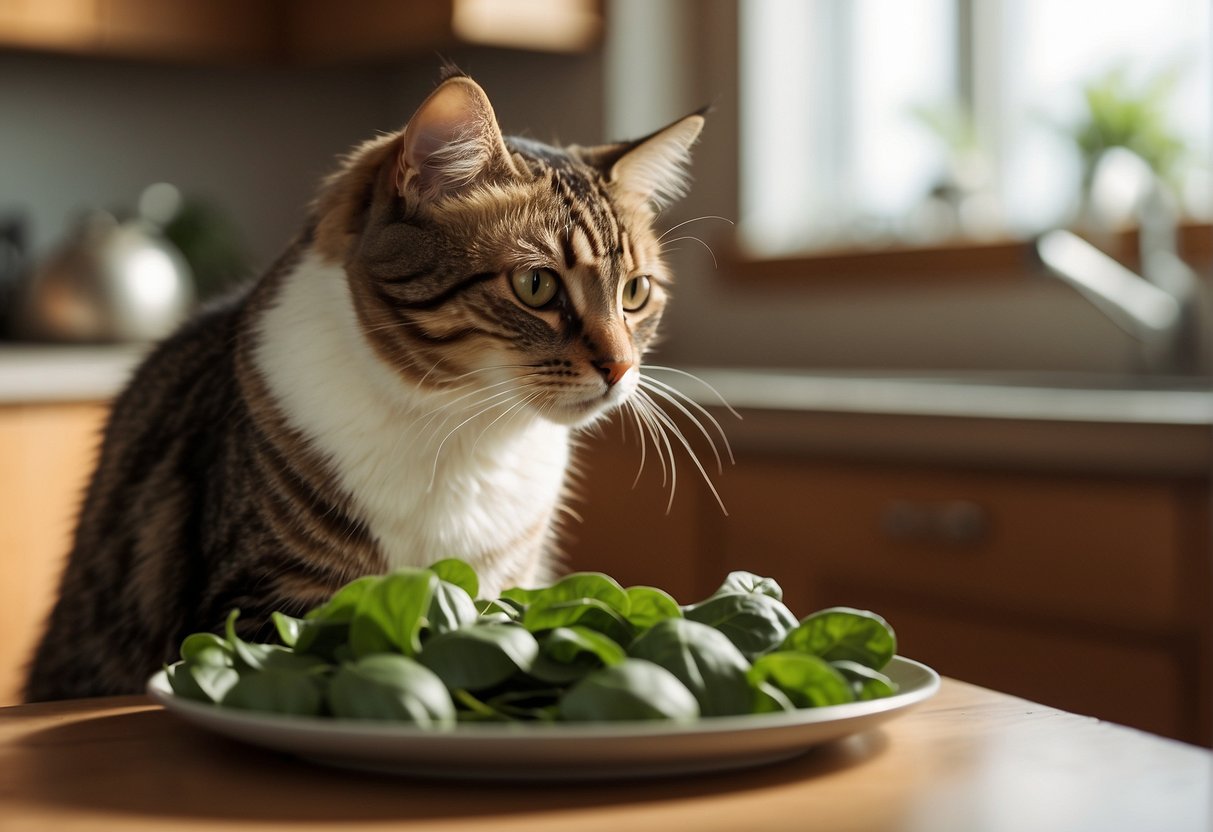
Ever wondered if spinach knows the difference between a Siamese and a Sphynx or a kitten and a grandpa cat?
Well, spinach doesn’t discriminate! But how it affects your feline friend might differ.
Impact on Different Cat Breeds
Generally, most cat breeds handle spinach in a similar way. However, individual health conditions—not breed specifics—often dictate whether spinach is a ‘yay’ or ‘nay’.
For instance, cats prone to urinary problems, like the Persian breed with their long history of kidney-related issues, should probably steer clear of spinach and kidney stones.
Why? Spinach is high in oxalates, which could compound these urinary problems and increase the risk of kidney stones and impact kidney function.
It is important to consider the potential impact on kidney function when deciding whether or not to include spinach in a cat’s diet, so you need to stay informed about the cat’s nutritional needs.
Considerations for Different Age Groups
- Kittens:
These little bundles of energy might find spinach a bit hard to digest. Their digestive systems are still developing, so giving them spinach isn’t necessary.
They need high-quality kitten food that’s specially formulated for their growth. - Adult Cats:
A nibble of spinach for your adult cat isn’t a problem, provided it’s not their main squeeze. Keep it occasional, though—think of it as a green treat! - Senior Cats:
As with adult cats, senior cats can also have spinach as a treat. But for those with a history of urinary issues, it’s prudent to pass on the leafy greens.
Remember, moderation is key for cats of all ages and breeds. And before introducing spinach to your cat’s diet, a chat with your vet is always a safe bet.
Your vet knows your cat’s unique history and can provide the best advice tailored to their needs, so keep updated with your feline dietary tips from your vet.
Here’s a quick peek at what you should consider:
| Age Group | Consideration | Reason |
| Kittens | Avoid spinach | Developing digestive systems, special dietary needs |
| Adult Cats | Spinach as an occasional treat | Balanced diet is vital |
| Senior Cats | Caution with spinach, especially with urinary health concerns | Risk of kidney and bladder issues |
Got all that? Great! Just remember, with the right precaution, spinach can be a safe snack, albeit an unnecessary one for your whiskered companion.
Practical Feeding Advice
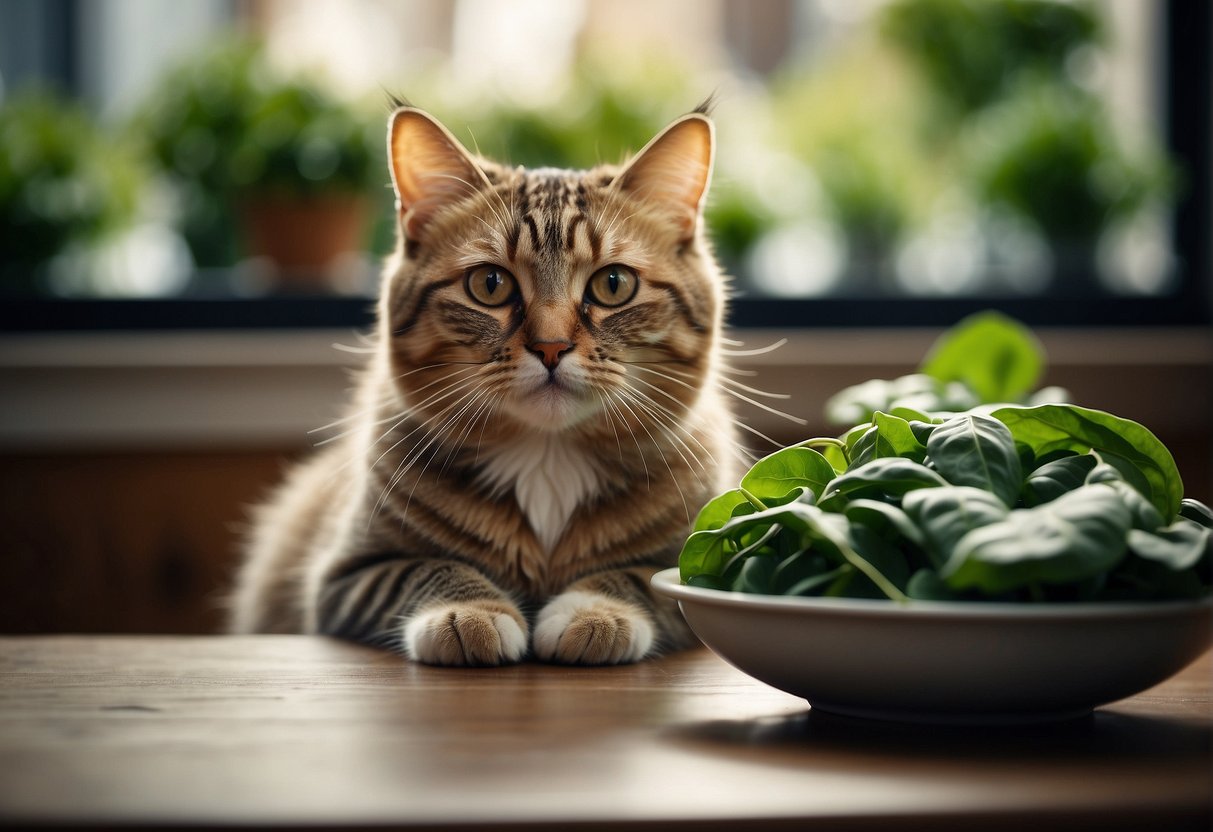
Introducing Spinach to a Cat’s Diet
Curious if your feline friend can join you in a leafy greens feast?
They can! Spinach can be a nutritious treat for cats, but moderation is key.
Here’s a simple step-by-step guide to safely introduce spinach to your cat’s diet:
- Consult Your Vet:
Before adding anything new to your cat’s menu, have a quick chat with your vet—especially if your cat has a history of urinary or kidney issues. - Start Small:
If your vet gives the green light, begin with a tiny piece of raw spinach. It lets you monitor how your cat reacts to this new food. - Cooked Over Raw:
Consider steaming or boiling the spinach to make it easier for your cat to digest. - Mixing It Up:
If your cat shows interest, mix a small amount of chopped spinach into their regular food. - Observation is Key:
Keep an eye out for any adverse reactions, such as changes in digestion or behavior.
Comparative Analysis with Other Vegetables
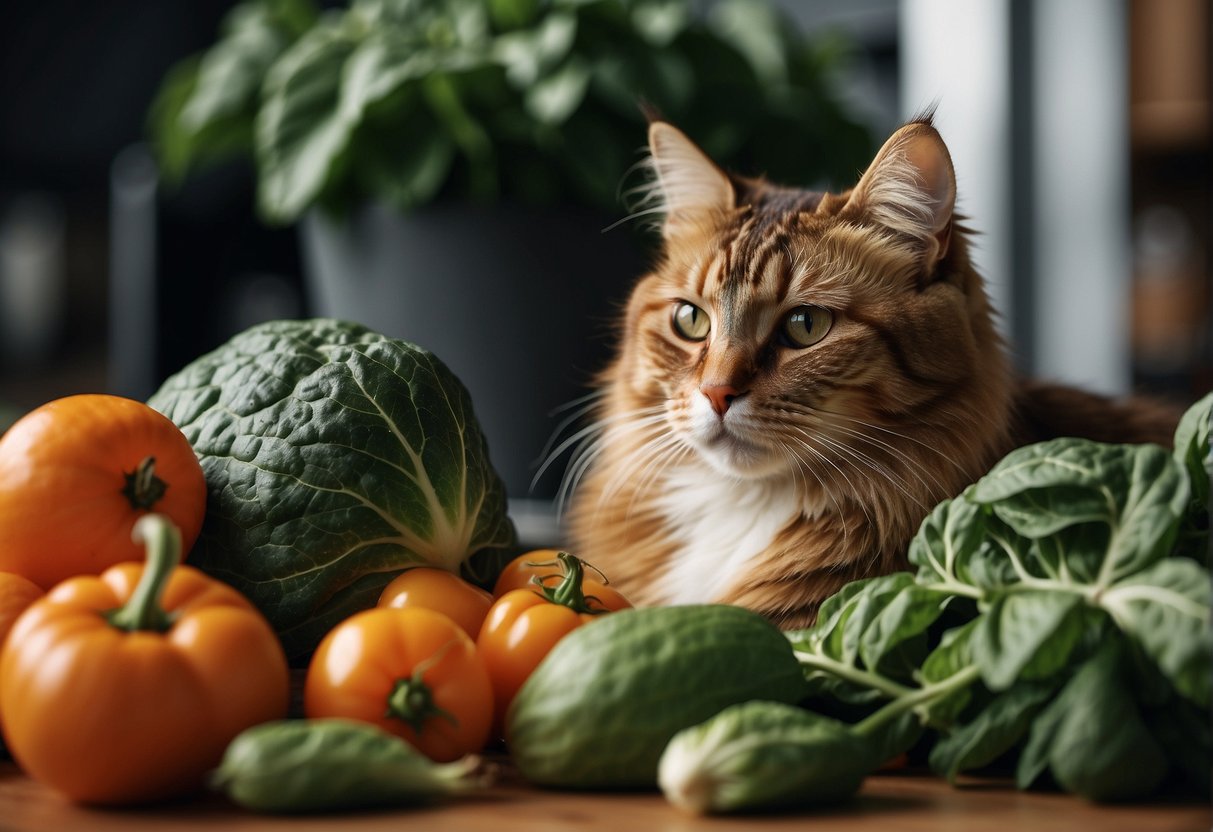
Ever wondered how spinach stacks up against other veggies when it comes to your feline’s feasting habits?
Let’s take a peek at how spinach fares in the garden with a variety of cat-friendly vegetables.
Spinach, though not poisonous, isn’t a superstar in your cat’s menu. High in nutritional value, it offers fiber and antioxidants, and it’s packed with vitamins and minerals.
But, like us after a holiday feast, some cats might not react well to spinach.
Broccoli, on the other hand, is a winner for its antioxidants and benefits for bowel movements. It’s safe and can be quite tasty for your kitty companion.
And then there are carrots, playing dual roles in both taste and roughage, aiming to keep your cat’s digestive system purring happily.
Here’s a quick rundown:
| Vegetable | Benefits for Cats | Considerations |
| Spinach | Fiber, antioxidants, vitamins | Not great for cats with urinary issues |
| Broccoli | Good source of vitamins improves digestion | Best served steamed or boiled |
| Carrots | Good source of vitamins, improves digestion | Serve cooked to ease chewing |
Now, isn’t it fascinating how each veggie brings something different to the table?
Your cat might show a penchant for greens, and that’s okay in moderation!
Remember, cats are carnivores by nature, so keep these vegetable treats sporadic and small.
Curious about how to incorporate these veggies into your cat’s diet? A tiny bit of steamed or mashed carrot, broccoli, peas, or even blueberries can be a novel treat.
But remember, always consult with your vet before making changes to your kitty’s diet, especially if they have existing health conditions.
After all, you want your fluffy overlord to stay both happy and healthy, right?
You can even keep a few blueberries in the freezer so your feline friend can have a frozen treat on a hot summer day.
Quick Recap
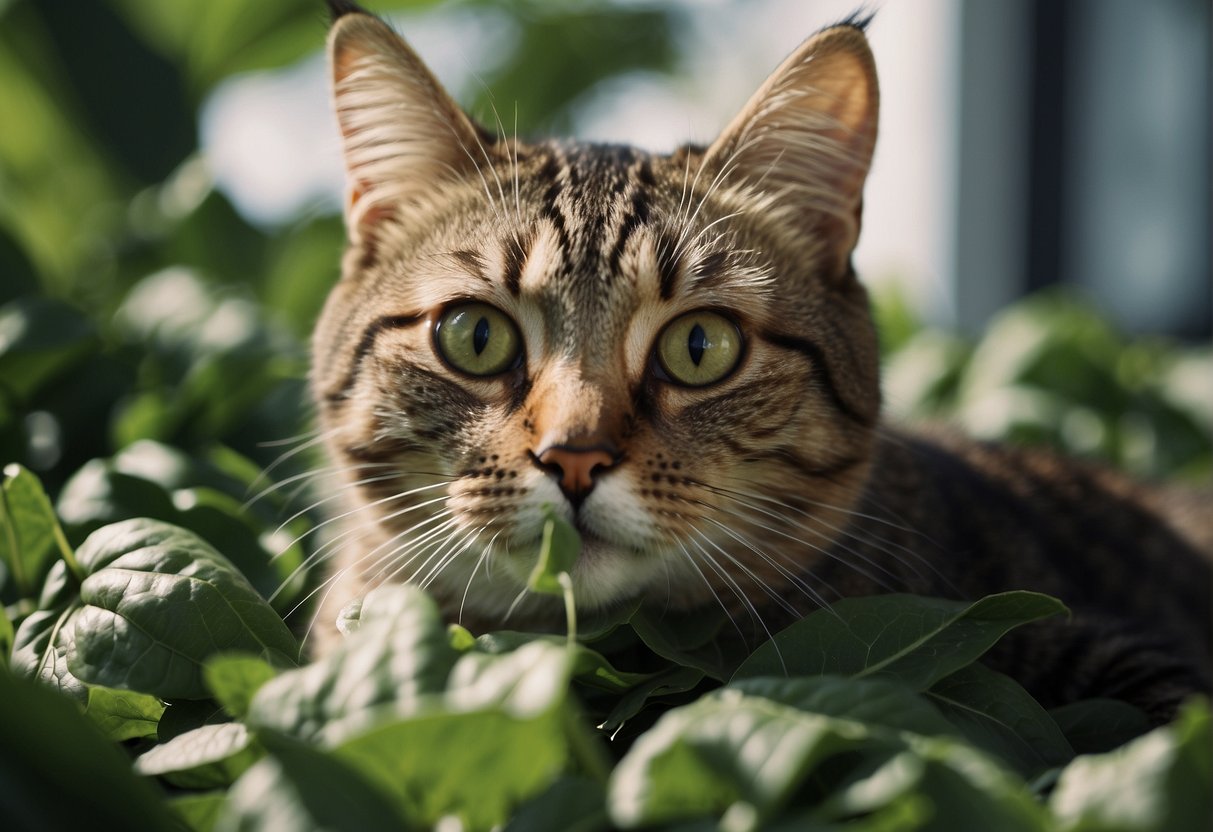
Hey there! Wondering if your whiskered companion can nibble on some spinach? Let’s leaf through the facts quickly.
Spinach: A Cat-Friendly Veggie?
- Yes to Spinach: In moderation, cats can eat spinach. It isn’t toxic to them, and many cat foods include spinach as an ingredient.
- Nutritional Benefits: Spinach offers some vitamins and minerals that can benefit your cat.
Check with Your Vet First:
- Health Check: Before adding spinach to your cat’s diet, consult your vet. Your cat’s unique health needs should be considered.
When to Avoid Spinach:
- Urinary Concerns: For felines with urinary or bladder issues, spinach could make things worse. It’s best to skip the spinach for these kitties.
Feeding Tips:
- Moderation Key: If cleared by the vet, offer a tiny amount. It’s not a necessary part of their diet but can be a healthy treat.
- No Garlic or Dairy: Remember, never serve spinach with garlic, nuts, or dairy – those are a no-go for cats!
To Spinach or Not to Spinach? Just because you can share your spinach with your furry buddy doesn’t mean you should make it a staple. High-quality cat food provides all the necessary nutrients.
So, keep that spinach intake light and enjoy knowing that you’re keeping your cat’s menu fresh and interesting, just as it should be!
Frequently Asked Questions
You’re probably wondering whether your whiskered companion can share in the leafy greens you enjoy.
Here’s a quick dive into the most common questions about cats and spinach!
Can Cats Eat Spinach Safely?
Yes, in moderation, your feline friend can safely enjoy spinach.
It’s non-toxic to cats, and many cat foods actually include spinach as an ingredient.
How Much Spinach Can I Feed My Cat?
Treat spinach like a treat, not a staple—just a small amount mixed in with their regular food is plenty.
Are There Any Health Benefits of Spinach for Cats?
Spinach is rich in vitamins and minerals which can be beneficial, but remember, cats are obligate carnivores, so they get most of their required nutrients from meat.
Can Kittens Eat Spinach?
Just like adult cats, kittens can have a bit of spinach.
However, their primary diet should be specially formulated kitten food that’s rich in the nutrients necessary for growth.
Are There Any Risks in Feeding Spinach to Cats?
If your kitty has a history of urinary or kidney issues, it’s wise to skip the spinach since it can cause problems due to its calcium oxalate content.
How Should Spinach Be Prepared for Cats?
Cook it simply—steamed or boiled without any salt, onions, or garlic—and chop it up to avoid choking hazards.
Can Spinach Affect a Cat’s Digestion?
It might, especially if they gobble up too much. A small nibble shouldn’t trouble their tummy, but overdoing it can lead to digestive upset.
Is spinach safe for cats to eat?
Yes, spinach can be safely included in a cat’s diet. It is a good source of vitamins and minerals, but should be given in moderation as too much can cause digestive upset.
It is always best to consult with a veterinarian before introducing any new food into your cat’s diet.

